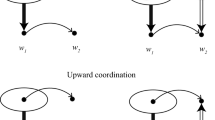Abstract
Analytical tools that give precision to the concept of "independence of syntax" are developed in the form of a series of substitutivity principles. These principles are applied in a study of the rôle of language in belief revision theory. It is shown that sets of sentences can be used in models of belief revision to convey more information than what is conveyed by the combined propositional contents of the respective sets. It is argued that it would be unwise to programmatically restrain the use of sets of sentences to that of representing propositional contents. Instead, the expressive power of language should be used as fully as possible. Therefore, syntax-independence should not be seen as a criterion of adequacy for language-based models of information-processing, but rather as a property that emerges from some but not all the idealization processes through which such models are constructed.
Similar content being viewed by others
References
C. E. Alchourrón, P. Gärdenfors, and D. Makinson. On the logic of theory change: Partial meet contraction and revision functions'. Journal of Symbolic Logic, 50:510-530, 1985.
C. E. Alchourrón and D Makinson. On the logic of theory change: Contraction functions and their associated revision functions. Theoria, 48:14-37, 1982.
Makinson D. On the force of some apparent counterexamples to recovery. In Valdś E.G., editor, Normative Systems in Legal and Moral Theory. Festschrift for Carlos E. Alchourrón and Eugenio Bulygin, pages 475-481. Duncker & Humblot, Berlin, 1997.
M. Dalal. Investigations into a theory of knowledge base revision: Preliminary report. In Seventh National Conference on Artificial Intelligence (AAAI-88), pages 475-479, 1988.
A. del Val. Non monotonic reasoning and belief revision: syntactic, semantic, foundational and coherence approaches. Journal of Applied Non-Classical Logics, 7:213-240, 1997.
E. Fermé and S. O. Hansson. Shielded contraction. to be published in H. Rott and M.-A. Williams (eds.), Frontiers of Belief Revision, Kluwer, 2000.
A. Fuhrmann. Relevant logics, modal logics, and theory change, 1988. Doctoral thesis.
A. Fuhrmann. Reflective modalities and theory change. Synthese, 81:115-134, 1989.
A. Fuhrmann. An Essay on Contraction. CSLI Publications, Stanford, 1997.
A. Fuhrmann and S.O Hansson. A survey of multiple contraction. Journal of Logic, Language and Information, 3:39-76, 1994.
P. Gärdenfors. An epistemic approach to conditionals. American Philosophical Quarterly, 18:203-211, 1981.
P. Gärdenfors. Belief revision and the ramsey test for conditionals. Philosophical Review, 95:81-93, 1986.
P Gärdenfors. Knowledge in Flux. Modeling the Dynamics of Epistemic States. The MIT Press, Cambridge, Massachusetts, 1988.
P. Gärdenfors and H Rott. Belief revision. In Gabbay, Hogger, and Robinson, editors, Handbook of Logic in AI and Logic Programming (vol. 4), pages 35-132. Oxford University Press, 1995.
S. O. Hansson. Theory contraction and base contraction unified. Journal of Symbolic Logic, 58:602-625, 1993.
S. O. Hansson. Taking belief bases seriously. In D. Prawitz and D. Westerstáhl, editors, Logic and Philosophy of Science in Uppsala, pages 13-28. Kluwer, 1994.
S. O Hansson. A survey of non-prioritized belief revision. Erkenntnis, 50:413-427, 1999.
S. O. Hansson. A Textbook of Belief Dynamics. Theory Change and Database Updating. Kluwer, 1999.
H. Katsuno and A. O Mendelzon. Propositional knowledge base revision and conditional logic. Artificial Intelligence, 52:263-294, 1991.
I. Levi. Subjunctives, dispositions and chances. Synthese, 34:423-455, 1977.
I. Levi. Iteration of conditionals and the ramsey test. Synthese, 76:49-81, 1988.
I. Levi. The Fixation of Belief and Its Undoing. Cambridge University Press, Cambridge, Mass., 1991.
S. Lindström and W. Rabinowicz. Epistemic entrenchment with incomparabilities and relational belief revision. In A. Fuhrmann, editor, The Logic of Theory Change, pages 93-126. Springer-Verlag, Berlin, 1991.
S. Lindström and W. Rabinowicz. The ramsey test revisited. In Crocco, editor, Conditionals: from Philosophy to Computer Science, pages 147-191. Clarendon Press, Oxford, 1995.
D. Makinson. On the status of the postulate of recovery in the logic of theory change. Journal of Philosophical Logic, 16:383-394, 1987.
D. Makinson. Screened revision. Theoria, 63:14-23, 1997.
R.B. Marcus. Extensionality. Mind, 69:55-62, 1960.
J. P. Martins and S.C. Shapiro. A model for belief revision. Artificial Intelligence, 35:25-79, 1988.
A. C. Nayak. Iterated belief change based on epistemic entrenchment. Erkenntnis, 41:353-390, 1994.
B. Nebel. Syntax based approaches to belief revision. In Gärdenfors, editor, Belief Revision, pages 52-88. Cambridge University Press, Cambridge, 1992.
H. Rott. Conditionals and theory change: Revision, expansions, and additions. Synthese, 81:91-113, 1989.
K. Schlechta. Some results on theory revision. In Fuhrmann, editor, The Logic of Theory Change, pages 72-92. Springer-Verlag, Berlin, 1991.
W. Spohn. Ordinal conditional functions: A dynamic theory of epistemic states. In W.L. Harper and B. Skyrms, editors, Causation in Decision, Belief Change and Statistics (vol. 2), pages 105-134. 1988.
E. Stenius. Ross' paradox and well-formed codices. Theoria, 48:49-77, 1982.
Author information
Authors and Affiliations
Rights and permissions
About this article
Cite this article
Hansson, S.O. The Rôle of Language In Belief Revision. Studia Logica 70, 5–21 (2002). https://doi.org/10.1023/A:1014650108036
Issue Date:
DOI: https://doi.org/10.1023/A:1014650108036



